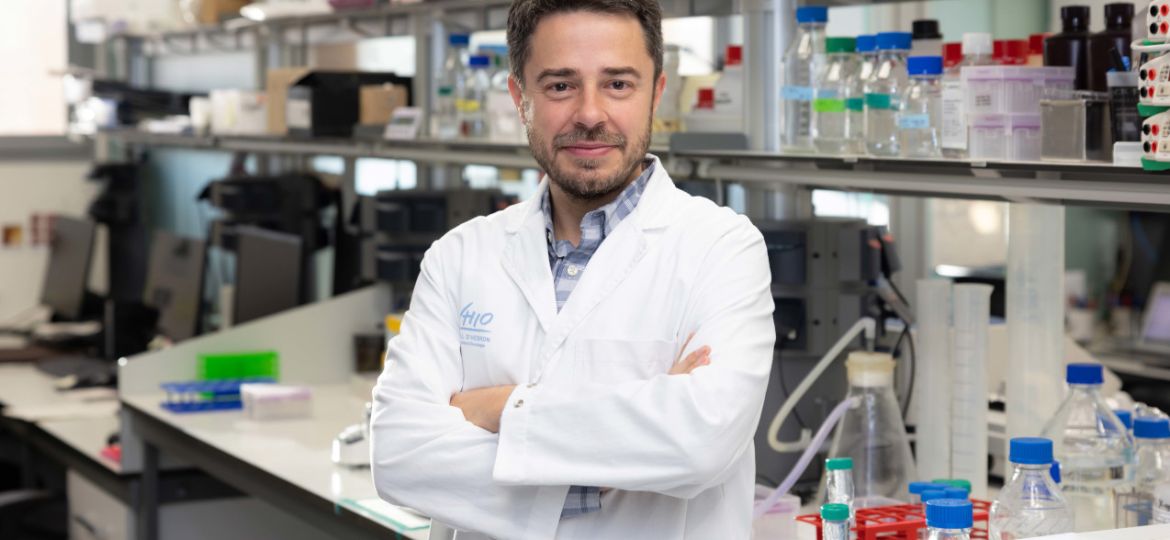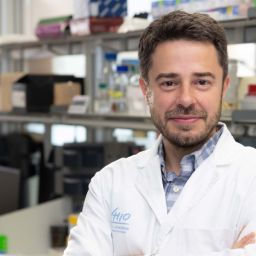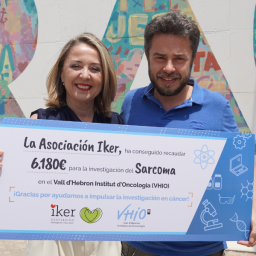
- Led by VHIO’s César Serrano, alongside first author Jonathan C. Trent at the Sylvester Comprehensive Cancer Center in Miami, an international team of investigators have performed multi-omic characterization of gastrointestinal stromal tumor (GIST) in a large real-world cohort of 946 patients.
- Results of this study* presented today during a Poster Discussion Session at the 2023 ASCO Annual Meeting, 2-6 June (Chicago, IL), could help to predict prognosis and the acquisition of cancer drug resistance in patients with GIST tumors.
Gastrointestinal stromal tumor (GIST) is a rare type of soft tissue sarcoma. Between 60-70% of GIST cancers develop in the stomach although they can occur anywhere in the wall of the digestive system, and can very rarely develop outside of the digestive system. Given the rarity of these tumors, molecular insights into GIST are limited. To date, few genes have been identified as relevant determinants of patient outcomes, tumor evolution, and as therapeutic drug targets.
“Between 75 and 80% of these patients harbor mutations in the KIT gene and approximately 10% present with mutations in the PDGFRA gene. Alterations in both genes promote cancer growth in patients with KIT- or PDGFRA-mutant GIST,” observes César Serrano, Principal Investigator of the Vall d’Hebron Institute of Oncology’s (VHIO) Sarcoma Translational Research Group and lead investigator of this present study*.
Imatinib —a type of cancer growth blocker called a tyrosine kinase inhibitor (TKI)— is the standard first-line treatment for GIST and achieves a response in up to 80% of patients presenting with these mutations. Most of these patients will however acquire cancer drug resistance either through new mutations in the PDGRFA and KIT genes or by other pre-existing molecular alterations that could also be relevant determinants of outcomes.
“Up until now, the molecular characterization of GIST has been limited to very small series of patient samples, with high methodological heterogeneity. Advancing insights into the molecular mechanisms of GIST is therefore key to achieving a deeper understanding of disease progression, cancer drug response, and identifying novel therapeutic targets toward improving outcomes for these patients,” adds Serrano, Medical Oncologist at the Vall d’Hebron University Hospital (HUVH).
Multi-omic characterization of GIST
To better define cancer driver mutations as clinical and genetic predictors of prognosis, response to treatment and acquired drug resistance in individual patients, the investigators dissected GIST’s molecular landscape in the largest series of real-world patients reported to date. This present study included 946 GIST patient samples (536 localized, 369 metastatic, 41 unknown) that underwent next-generation sequencing of DNA and RNA.
“We have more precisely defined the molecular subtypes of GIST in terms of numbers and distribution. 80% of the samples presented mutations in KIT, 8.1% mutations in PDGFRA, and 11.7% did not present mutations in these genes. Also of note, 14.8% of samples harbored a secondary KIT variant suggestive of TKI resistance,” says César Serrano.
The researchers have also described the mutation frequency and regions within the KIT and PDGFRA genes, and identified less common molecular alterations that drive kinase activation and impaired DNA damage repair, warranting further investigation.
“This series provides unprecedented resolution of KIT/PDGFRA-mutant GIST with features of clinical aggressiveness associated with resistance mutations. These insights will ultimately enable us to match targeted treatments to the molecular profile of individual patients,” concludes Serrano.
###
Reference:
* Multi-omic characterization of gastrointestinal stromal tumor (GIST) in a large real-world patient cohort. Jonathan C. Trent, David Gómez-Peregrina, Andrew Elliott, Sosipatros Boikos, Vaia Florou, Margaret vonMehren, John Charlson, Gabriel Tinoco, Robert Maki, Suzanne George, Aditi Dhir, Daruka Mahadevan, Matthew Oberley, George Sledge, Gina D’Amato, César Serrano.
Abstract #: 11522
Poster Bd #: 456
Track: Sarcoma
Session Type: Poster Discussion Session
First Author: Jonathan C. Trent, MD, PhD, Sylvester Comprehensive Cancer Center, University of Miami Miller School of Medicine
Citation: J Clin Oncol 41, 2023 (suppl 16; abstr 11522)




















